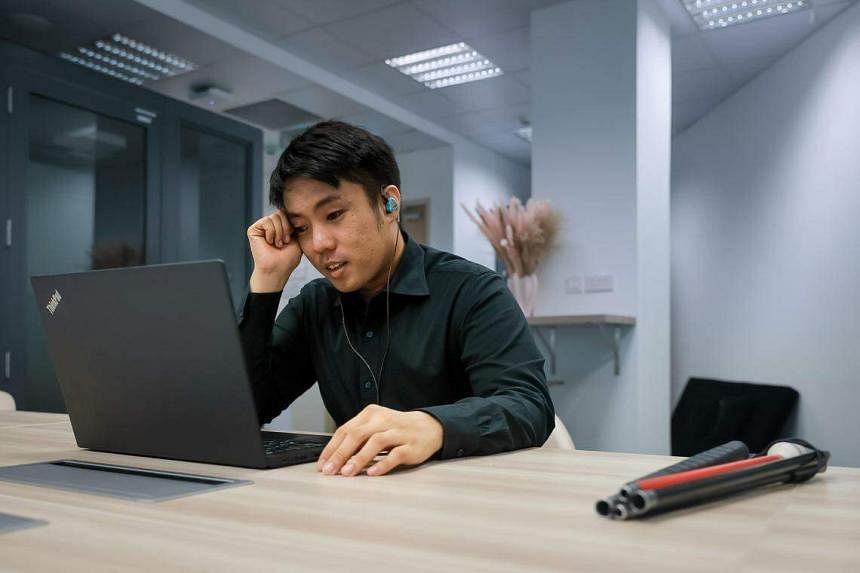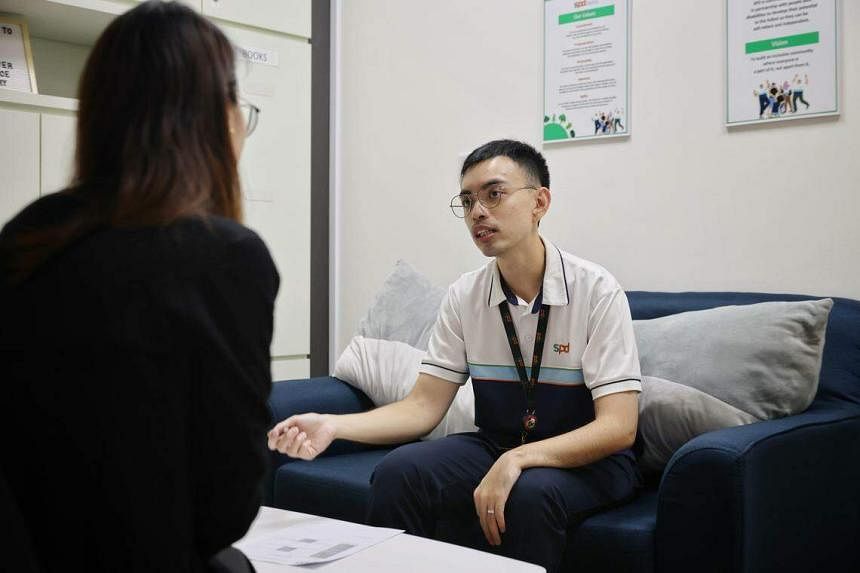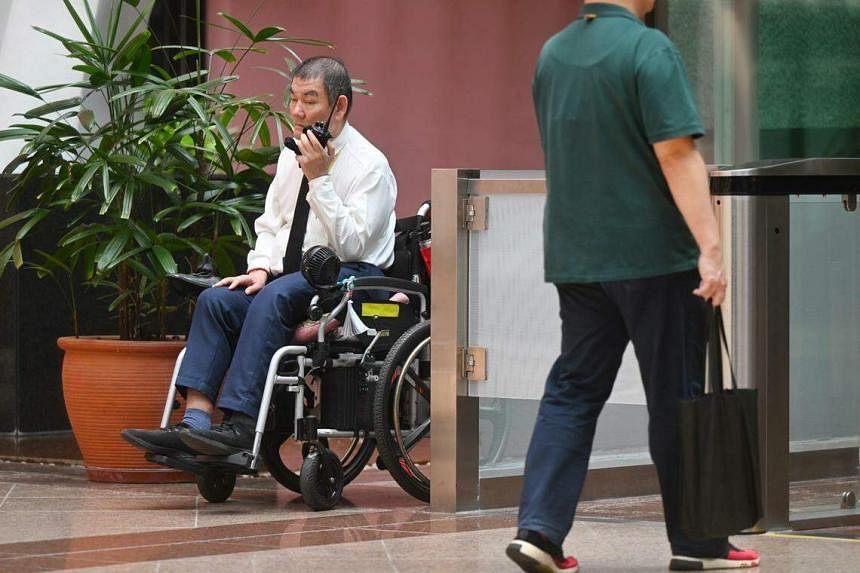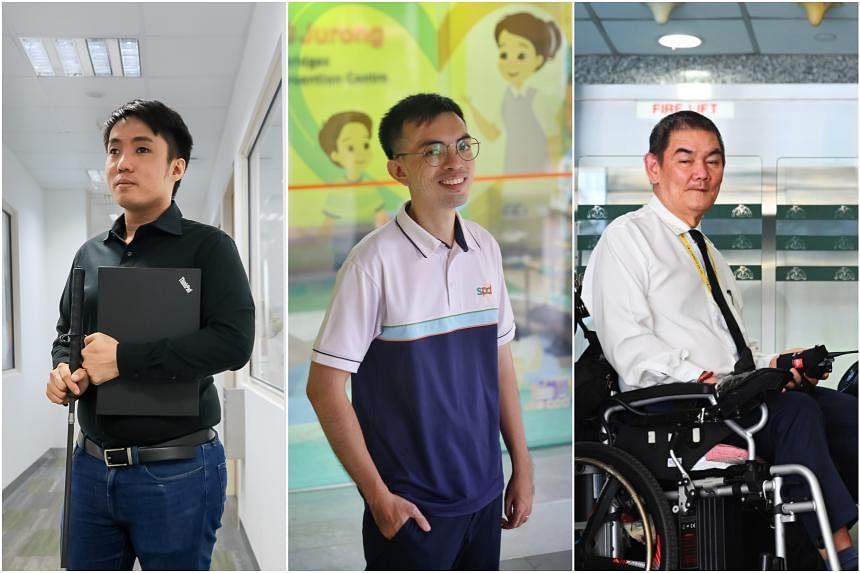SINGAPORE – Job opportunities for people with disabilities (PWDs) have grown in the past three years, with more employers adapting roles to different needs and creating new positions.
Beyond the food and beverage and hospitality industries, disability agency SG Enable is seeing more PWDs being hired in growth sectors such as logistics, healthcare, information technology, banking and the public sector.
Mr Tan Eng Tat, SG Enable’s director of employment and employability, said that for every 100 job seekers with disabilities, there were about 240 job vacancies with inclusive employers in the financial year that ended in March 2023. This is similar to the 250 vacancies in 2022 and up from 150 vacancies in 2021.
In the mainstream labour market, there were about 194 vacancies per 100 unemployed people in June 2023, compared with 257 vacancies in the same month in 2022, and 160 in June 2021.
The Straits Times spoke to three PWDs about the challenges they face at work and how they adapt.
Mr Joshua Tseng, who is blind, has been an accessibility consultant with non-profit organisation Etch Empathy since April 2022.
After graduating with an information systems degree from Singapore Management University, the 26-year-old joined the organisation and started a team to look into the accessibility of software like apps and websites.
Among the organisations he has worked with are the National Library Board, FairPrice, GovTech and SBS Transit.
Mr Tseng said companies benefit from making their services accessible, as people with disabilities form the largest global minority group, at about 16 per cent of the world’s population.
Visually impaired people use screen readers, which convert text and images into speech, but buttons on ride-hailing and banking apps often cannot be read as they are not labelled properly by developers – unlike the gold standard set by the likes of Microsoft and Google, said Mr Tseng.
He added that websites with clear fonts and high-contrast graphics can also benefit seniors and the larger community.
In August, he founded media production company Blind Mice Media to raise awareness of accessibility work through TikTok videos and other social media content on the challenges faced by blind people.
On TikTok, he humorously addresses questions such as “How do blind people use an iPhone?”, and situations he encounters such as strangers giving him money.
Mr Tseng has faced scepticism over his abilities. “People assume: ‘You’re just talking in front of a camera, surely you don’t do any of the other work right?’”

In fact, he writes the scripts and makes decisions in the video-editing process.
While he needs his co-workers to help him find reference videos, he brainstorms with them once the videos are described to him. He works with two other full-time employees and several freelancers.
“I think there really are a lot more (job) options than people realise, even people with disabilities themselves,” said Mr Tseng.
Mr Tan said SG Enable has placed 5,500 PWDs in jobs since 2014, through its job placement and job support programmes. More than 80 per cent of them retained their jobs for over six months, he added.
Some 10,000 more PWDs have to be employed to reach the Government’s target employment rate of 40 per cent for them by 2030, up from 31 per cent today.
Mr Lee Yong Jie, 29, had a life-threatening stroke when he was 19. He is now a social worker who helps parents of children with autism and global developmental delay.
He walks with a slight limp and has some weakness on his left side. Mobility in his left hand is limited, but he has learnt to do most things with his right hand.
His co-workers at SPD@Jurong help him to photocopy documents for caregivers when he is in a hurry.

Mr Lee wanted to go into the finance or the technology sector, but he changed his mind after the stroke.
“I felt that life gave me a second chance, and I really wanted to use this opportunity to find more meaningful work that I could pursue,” he said.
He recalled the social workers who helped him when he was recovering.
He also recounted his mother’s loneliness while caring for him when he had to use a wheelchair. She often cried in the toilet and did not share her troubles with her husband to avoid burdening him.
“I see myself as someone to journey together with these caregivers, to make sure that they are not alone,” said Mr Lee, who links families with financial support, counselling, job support and other caregivers.
He feels proud when he sees caregivers grow. He recounted how one caregiver came to him lost and anxious over her toddler son’s special needs. He helped her process her emotions and find a support network, and in time, she grew confident in caring for her son and could even support other caregivers.
Security officer Lim Kee Hock, 65, moves around using an electric wheelchair at the Old Hill Street Police Station building. His left leg was amputated in 2017 because of a diabetic infection.
SG Enable and SPD helped him to secure a job with security firm Cominco in July.

Mr Lim does not do patrols as his wheelchair cannot access certain areas such as those with stairs, but he rotates between the carpark, guard post, loading bay and lobby.
When he cannot reach delivery drivers in time to get their details, he calls his colleagues for help.
He said ministers go in and out of the Ministry of Communications and Information in the building, where many events take place, and he needs to look out for suspicious people and items.
Having worked as a senior sales executive, he is adept at observing and dealing with people, he said.
As part of his work now, he stops people who do not listen to his instructions from entering the building.
“We can prove to employers that people with disabilities can do what others can do. The important thing is that the opportunity is given to us,” he said.


